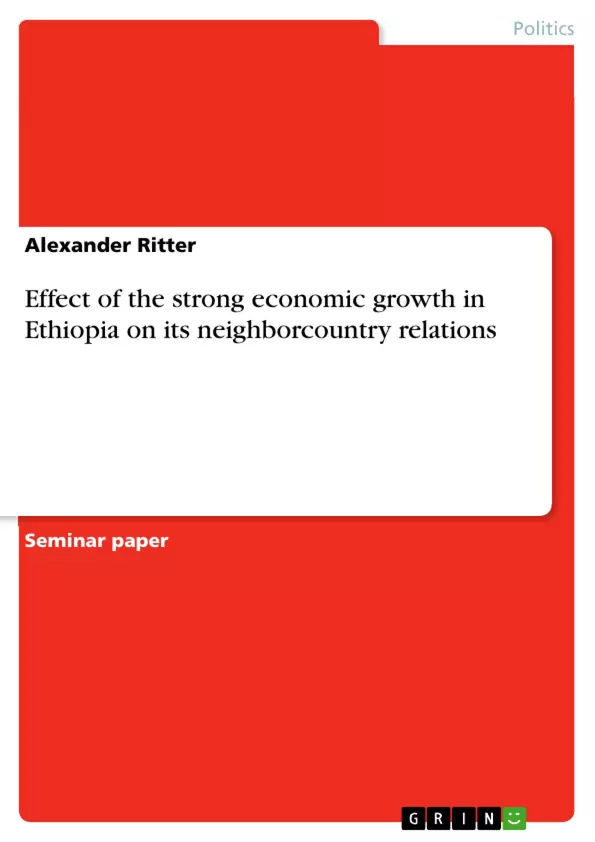This essay analyses and interprets changes in foreign relations between Ethiopia and its neighbor states dependent on Ethiopia’s strong economic growth in recent years. The author bases his analysis on the rational-actor model of foreign policy analysis.
Ethiopia’s economic growth is strongly tied to its investments in agriculture and electricity from hydropower, which not only creates opportunities for the region but also causes some negative externalities. The treat of water deficiency is particularly high for Egypt, which largely depends on the waters of the Nile, with its supply being threatened by the completion of the Grand Ethiopian Renaissance Dam (GERD) in 2017.
Water politics with regards to foreign policy in addition to domestic conflict potentials are the most significant political challenges for Ethiopia today. The rational-choice model will help to identify these challenges in greater detail and country-specifically and will help to provide solutions for informed decision-making.
Inhaltsverzeichnis (Table of Contents)
- Introduction
- Ethiopia's status quo in economic development and neighbor relations
- Dealing with the Horn countries
Zielsetzung und Themenschwerpunkte (Objectives and Key Themes)
This essay analyzes the impact of Ethiopia's rapid economic growth on its relations with neighboring countries, utilizing the rational-actor model of foreign policy analysis. The focus is on how Ethiopia's investments in agriculture and hydropower, while creating regional opportunities, also generate negative externalities, particularly for Egypt regarding Nile water resources.
- The influence of economic growth on foreign relations between Ethiopia and its neighbors
- The role of the rational-actor model in analyzing state behavior
- The impact of Ethiopia's hydropower projects on water resources in the region
- The potential for conflict and cooperation arising from Ethiopia's economic development
- The application of the small state/big state logic in understanding Ethiopia's foreign policy
Zusammenfassung der Kapitel (Chapter Summaries)
- Introduction: This section provides historical context on Ethiopia, highlighting its unique position as an uncolonized African nation and its transition from monarchy to socialist dictatorship and finally to a federal parliamentary republic. It emphasizes Ethiopia's impressive economic growth and its potential implications.
- Ethiopia's status quo in economic development and neighbor relations: This chapter outlines Ethiopia's geographical context within the Horn of Africa, emphasizing its landlocked position and dependence on neighboring countries for port services. The chapter highlights the significance of the Nile River for Ethiopia's development and the potential for conflict with Egypt over water resources. The chapter also explores internal ethnic tensions and the possibility of external interference in Ethiopian affairs.
- Dealing with the Horn countries: This chapter examines the potential benefits and drawbacks of Ethiopia's economic growth for its neighbors in the Horn of Africa. It highlights the increased demand for port services and the potential for electricity exports, while also addressing concerns regarding water scarcity and the potential for conflict over water resources.
Schlüsselwörter (Keywords)
This essay centers on the intersection of economic growth, foreign policy, and regional relations. Key terms include: Ethiopia, Horn of Africa, rational-actor model, economic development, hydropower, Grand Ethiopian Renaissance Dam (GERD), Nile River, water politics, conflict, cooperation, small state/big state logic, virtual water.
Frequently Asked Questions
How does Ethiopia's economic growth affect its relations with its neighbors?
Ethiopia's rapid growth, driven by agriculture and hydropower, creates regional opportunities such as electricity exports but also causes tensions, especially regarding water rights and port access.
What is the significance of the Grand Ethiopian Renaissance Dam (GERD)?
The GERD is a massive hydropower project that is central to Ethiopia's energy strategy but is seen as a major threat by Egypt, which depends heavily on the Nile's water supply.
What role does the "rational-actor model" play in this analysis?
The rational-actor model is used to interpret the foreign policy decisions of Ethiopia and its neighbors, assuming that states act as unified entities to maximize their national interests and goals.
Why is Ethiopia's landlocked position a challenge for its growth?
Being landlocked makes Ethiopia dependent on neighboring countries (like Djibouti) for port services, which influences its diplomatic strategies and economic stability in the Horn of Africa.
What are the internal challenges facing Ethiopia's development?
Internal challenges include ethnic tensions and domestic conflict potentials, which can be exacerbated by rapid economic shifts and may invite external interference from neighboring states.
What is meant by the "small state/big state logic" in this context?
It refers to the power dynamics in the region where Ethiopia, as an emerging "big state" due to its economy and population, shifts the balance of power, forcing "smaller" neighbors to adapt their foreign policies.
- Quote paper
- Alexander Ritter (Author), 2016, Effect of the strong economic growth in Ethiopia on its neighborcountry relations, Munich, GRIN Verlag, https://www.grin.com/document/379639



